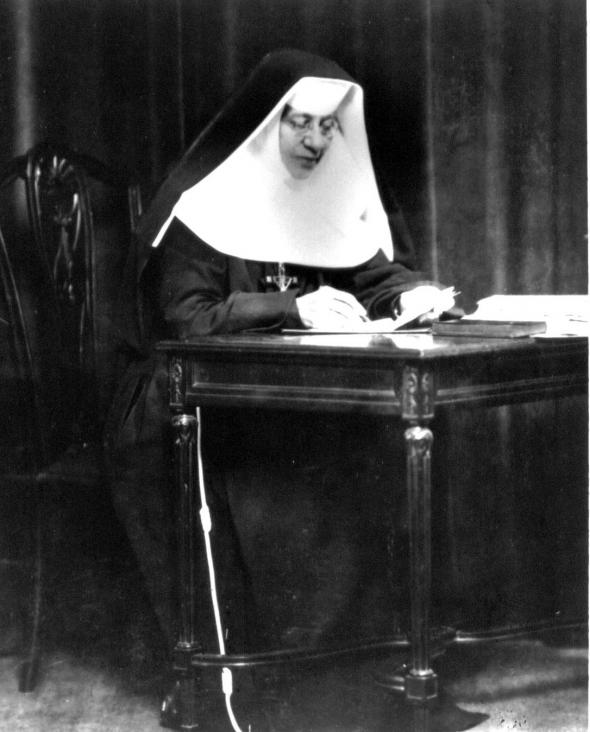 by Theresa Cavicchio
by Theresa CavicchioThe rarified atmosphere of center city Philadelphia was the privileged milieu into which Katharine Drexel (1858 – 1955) came into the world. The second child of wealthy financier Francis Drexel and Hannah Langstroth, sadly, Katharine and her sister Elizabeth suffered the loss of their mother in Katharine’s fifth week of life.
Francis then married Emma Bouvier, and a daughter, Louise, was born to them. Emma was a gentle, loving mother to her three girls. Their elegant home on fashionable Walnut Street was a happy one, filled with love and faith. It featured an oratory which Francis visited daily; the whole family gathered there each night for prayers before bed.
Faith in action was also a matter of course. The Drexel girls were taught their solemn obligation to share the abundant blessings they enjoyed. Emma Drexel opened the doors of their home three days weekly, distributing food, clothing, and funds to the needy. In time, her daughters joined in this work of mercy.
The girls received an excellent education with professional tutors, and benefited from travel experiences at home and abroad. Very much like other girls of her social class, Katharine longed to have her ears pierced, received a regular allowance, and made her entrance into society with her debut.
Setting her apart from a very young age, though, was Katharine’s great love for Jesus in the Holy Eucharist. She lobbied for First Communion earlier than 12, the age typical at the time, succeeding at 11. Her devotion to Jesus in the Eucharist remained a hallmark of her long life, one of two driving forces characterizing her future; the other, a burning desire to alleviate injustices toward people of color.
A family trip to the West gave Katharine a first-hand glimpse of the oppression endured by Native Americans. Even before entering religion, she helped to fund numerous schools and missions for twin purposes: evangelization and education of Native American peoples. Her generosity quickly extended also to address similar needs in the Black community, close to home and farther afield.
These worthwhile efforts were interrupted when Emma Drexel fell seriously ill. She suffered grievously for several years, Katharine nursing her lovingly until her death in 1883. Two years later, Francis followed his wife in death.
Katharine took these deeply personal losses very hard. To help her recover, her sisters suggested a trip to Europe, including an audience with the reigning Pope Leo XIII. Katharine expressed a request for missionaries to the American West. The Holy Father’s suggestion that she take on the task herself startled her, even though she had been praying concerning a possible call to a religious vocation. Her long-time spiritual director and family friend, Bishop James O’Connor, dissuaded her initially but acceded when Katharine finally convinced him that, through prayer, she had felt God’s call very clearly. Her journey as a foundress was about to begin.
Katharine’s new order – the Sisters of the Blessed Sacrament for Indians and Colored People – combined her two passions. In 1891, Mother Katharine spoke vows of poverty, chastity, and obedience, but also a fourth: “to be the mother and servant of the Indian and Negro races according to the rule of the Sisters of the Blessed Sacrament; and not to undertake any work which would lead to the neglect or abandonment of the Indian and Colored races” (language in common usage at the time).
Post-Civil War migrations, coupled with an influx of immigrants to America, often fueled highly-charged tensions, sometimes spilling over into violence born of racism and bigotry. These evils would remain a continuing challenge as the Sisters’ work progressed and spread even to the deep south.
Despite such challenges, Mother Katharine and her Sisters traveled widely throughout the U.S., founding missions, boarding schools, and day schools wherever Mother perceived the need to be greatest – wide open lands of the West or inner cities rife with poverty. Their efforts on behalf of Native American and Black children were often met with stiff resistance and even acts of violence by segregationist individuals and groups.
Mother Katharine persevered. At the time of her death, her diligence and unstinting generosity had produced over a hundred missions and over sixty educational institutions. Perhaps her crowning achievement lives on today – Xavier University in New Orleans, the country’s first historically Black Catholic university.
As the decades passed, Mother Katharine’s health suffered a series of setbacks. A severe heart attack ushered in the final twenty years of her life, spent in seclusion at her Motherhouse. There she found spiritual peace in private times of prayer overlooking the chapel where her beloved Eucharistic Lord rested on the altar.
The heiress who had renounced a life of ease and comfort, having donated her entire fortune through great poverty of spirit, went quietly home to God on March 3, 1955, abundantly rich in wealth that the world cannot give.
Katharine Drexel was beatified by Pope Saint John Paul II in 1988 and canonized by him in 2000.
Her holy remains now lay in the Cathedral Basilica of Saints Peter and Paul in Philadelphia. Francis Drexel had contributed to the cathedral’s construction; quite fittingly, the saint’s tomb now rests adjacent to the altar which his three daughters donated in memory of their deceased parents.
The long, well-spent life of Saint Katharine Drexel stands as a testament to the proper and generous use of earthly wealth for a heavenly cause: to promote the faith and social justice, enhancing the lives of countless suffering souls. Today, many years after her death, a glance at a daily newscast proves that her intercessions are still needed to combat racism and injustice.
Source material for this article is taken chiefly from Saint Katharine Drexel: Apostle to the Oppressed by the late Lou Baldwin, prolific writer and one-time resident of a Drexel-established vocational school.
© All Rights Reserved, Living His Life Abundantly®/Women of Grace® http://www.womenofgrace.com
